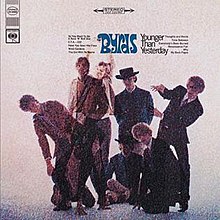| Younger Than Yesterday | ||||
|---|---|---|---|---|
 | ||||
| Studio album by | ||||
| Released | February 6, 1967 | |||
| Recorded | November 28 – December 8, 1966 | |||
| Studio | Columbia, Hollywood | |||
| Genre | ||||
| Length | 29:11 | |||
| Label | Columbia | |||
| Producer | Gary Usher | |||
| The Byrds chronology | ||||
| ||||
| Singles from Younger Than Yesterday | ||||
| ||||
Younger Than Yesterday is the fourth studio album by the American rock band the Byrds and was released on February 6, 1967, on Columbia Records.[1][2] It saw the band continuing to integrate elements of psychedelia and jazz into their music, a process they had begun on their previous album, Fifth Dimension.[1][3] In addition, the album captured the band and record producer Gary Usher experimenting with new musical textures, including brass instruments, reverse tape effects and an electronic oscillator.[4]
The album also marked the emergence of the band's bass player Chris Hillman as a talented songwriter and vocalist.[5][6] Prior to Younger Than Yesterday, Hillman had only received one shared writing credit with the Byrds, but this album saw him credited as the sole composer of four songs and a co-writer of "So You Want to Be a Rock 'n' Roll Star".[4] Byrds expert Tim Connors has remarked that two of Hillman's compositions on Younger Than Yesterday exhibited country and western influences and thus can be seen as early indicators of the country rock experimentation that would feature—to a greater or lesser degree—on all of the Byrds' subsequent albums.[6]
Upon release, the album peaked at number 24 on the Billboard Top LPs chart and reached number 37 on the UK Albums Chart.[7][8] It was preceded by the "So You Want to Be a Rock 'n' Roll Star" single in January 1967, which reached the Top 30 of the Billboard Hot 100.[9] Two additional singles taken from the album, "My Back Pages" and "Have You Seen Her Face", were also moderately successful on the Billboard singles chart.[9] However, none of the singles taken from the album charted in the United Kingdom.[8] Music critics Richie Unterberger and David Fricke have both remarked that although it was largely overlooked by the public at the time of its release, the album's critical standing has improved over the years and today Younger Than Yesterday is considered one of the Byrds' best albums.[1][10] The title of Younger Than Yesterday is derived from the lyrics of "My Back Pages", a song written by Bob Dylan, which was covered on the album.[11]
- ^ a b c Unterberger, Richie. "Younger Than Yesterday album review". AllMusic. Rovi Corp. Retrieved 2010-01-02.
- ^ Rogan, Johnny (1998). The Byrds: Timeless Flight Revisited (2nd ed.). London: Rogan House. pp. 544–546. ISBN 0-9529540-1-X.
- ^ Huxley, Martin (1995). Psychedelia: The Long Strange Trip. Friedman Fairfax. p. 29. ISBN 1-56799-228-5.
- ^ a b Rogan, Johnny (1996). "Song notes by Johnny Rogan". Younger Than Yesterday (CD booklet). The Byrds. Columbia/Legacy.
- ^ Schinder, Scott; Schwartz, Andy (2007). Icons of Rock: An Encyclopedia of the Legends Who Changed Music Forever. Westport, CT: Greenwood Press. p. 269. ISBN 978-0-313-33845-8.
- ^ a b Connors, Tim. "Younger Than Yesterday". ByrdWatcher: A Field Guide to the Byrds of Los Angeles. Euclid Business Network. Archived from the original on 2009-04-28. Retrieved 2009-08-04.
- ^ Whitburn, Joel (2002). Top Pop Albums 1955–2001. Menomonee Falls, WI: Record Research Inc. p. 121. ISBN 0-89820-147-0.
- ^ a b Brown, Tony (2000). The Complete Book of the British Charts. London: Omnibus Press. p. 130. ISBN 0-7119-7670-8.
- ^ a b Whitburn, Joel (2008). Top Pop Singles 1955–2006. Menomonee Falls, WI: Record Research Inc. p. 130. ISBN 978-0-89820-172-7.
- ^ Fricke, David (1996). "Fame and Misfortune: The End of the First Golden Era". Younger Than Yesterday (CD booklet). The Byrds. Columbia/Legacy.
- ^ Hjort, Christopher (2008). So You Want To Be A Rock 'n' Roll Star: The Byrds Day-By-Day (1965–1973). London: Jawbone Press. pp. 118–120. ISBN 978-1-906002-15-2.